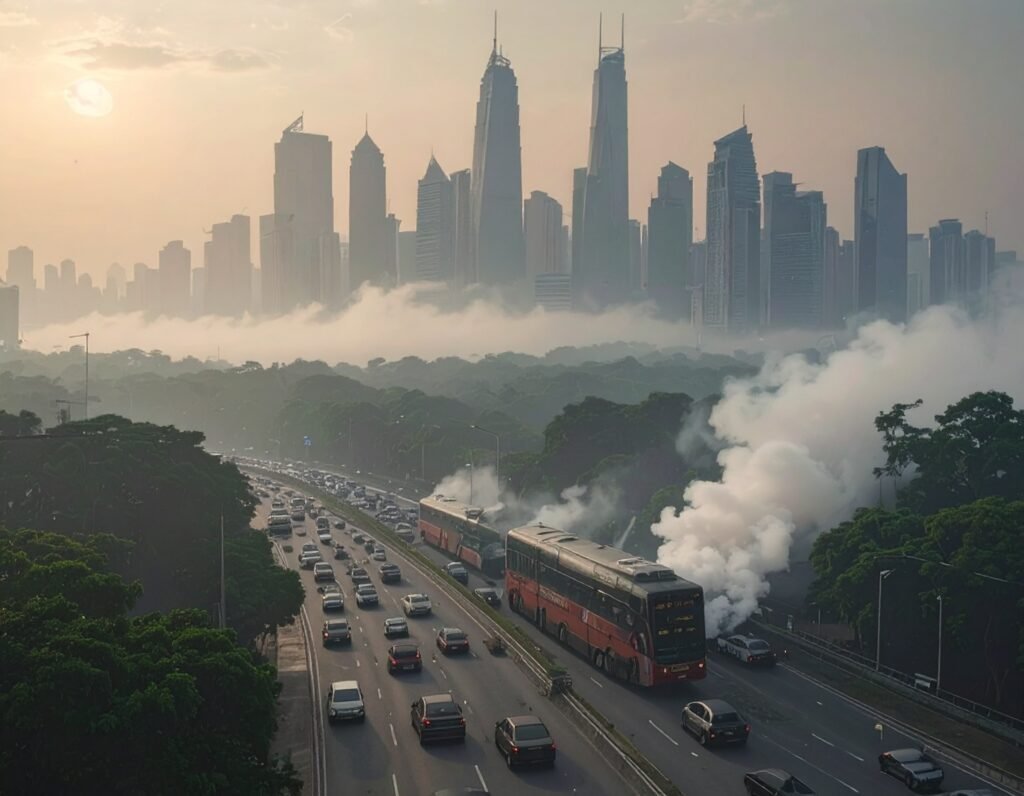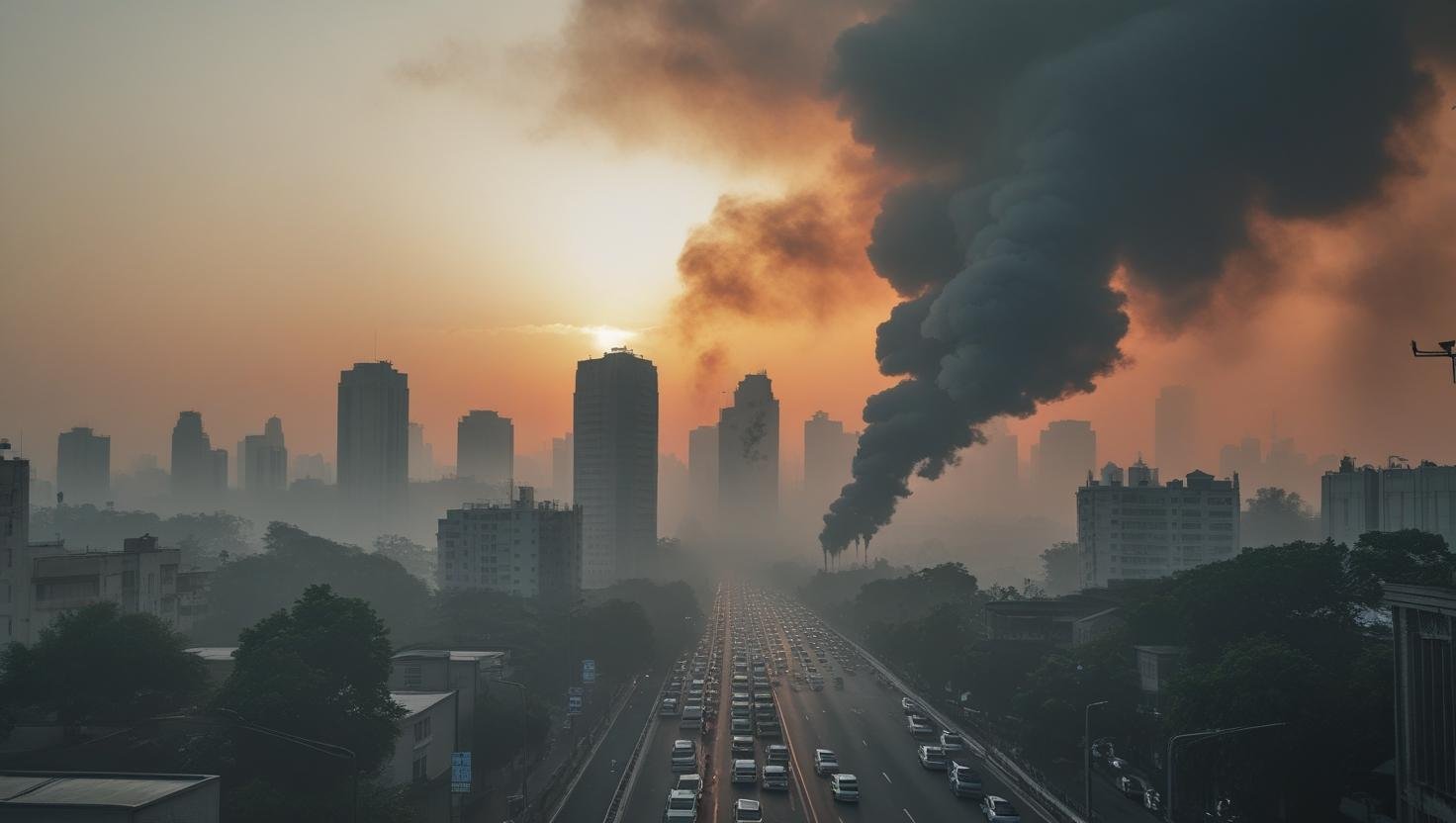Introduction
Cities are the lifeblood of the new world. They embody advancement, prospects, and development. However, the large cities that boast those skyscrapers and roadways also have a lot of pollution to carry with them. The rise in polluting vehicles is one of the many causes of urban pollution. The toll of vehicular pollution is visible, tangible, and frightening from the smoggy skies above us to the growing asthma rates.
In this blog, we look at how vehicle emissions drive urban pollution, the case for why it is a dangerous problem, and how cities can respond to this escalating crisis.
What Are Vehicle Emissions?
Vehicle emissions are the gases and fine particles produced by burning fuel in cars, trucks, buses and other motorized vehicles. These emissions include:
- Carbon dioxide (CO₂): the most prominent greenhouse gas responsible for climate change.
- Nitrogen Oxides (NOx): contribute to air pollutants such as smog and respiratory illnesses.
- Particulate Matter (PM2. PM2.5 & PM10): tiny particles that damage lungs and hearts.
- Carbon Monoxide (CO): a poisonous gas that decreases the supply of oxygen in the body.
- Ground Level Ozone Precursor (VOCs): form ground level ozone in combination with NOx.
Every time we run an engine, this emission goes into the atmosphere and into already vulnerable urban environments.

How Urban Pollution is Linked to Vehicle Emissions
There are millions of vehicles in urban areas. As the population and economy have grown, the number of cars has ballooned. The result? An outright uptick in pollution.
Smog Formation
Smog is the dirty, yellow-brown cloud that coats major population centres. It occurs due to a reaction between sunlight and vehicle emissions, especially NOx and VOCs. Delhi, Beijing, and Los Angeles have fought acute smog crises that have closed schools and put masks on faces.
Air Quality Deterioration
The WHO (World Health Organisation) has established air quality guidelines; however, most cities have pollution levels very much above the safe 30 µg/m³ limit set out by the WHO due to vehicle emissions. This will cause millions of premature deaths worldwide every year.
Noise Pollution
Although air polluters cannot be seen, noise is an additional pitfall of urban transport. The incessant honking, loud engines, and traffic pressure stress the mind and body.
Heat Island Effect
The overall traffic density and perpetual combustion of petrol and diesel cause increased city temperatures. This “heat island effect” increases temperatures in cities above those in the nearby countryside and exacerbates climate impacts.
Working Paper: The Economic Burden of Vehicle-Derived Pollution in Urban Areas
Pollution is not only an environmental challenge but also an economic challenge to humanity. Cost of emissions: Cities lose billions every year. Here’s how:
- Healthcare Costs
Dirty air causes respiratory diseases, heart disease, and even cancer. Trillions of dollars from government budgets and personal pockets are spent on treatment, medicines, and (here we go again) more hospital visits. - Lost Productivity
Lost productivity due to sick days from bad air quality. Those with asthma or tired because of pollution will contribute less to the economy or financially support the country less. - Property Damage
Nitrogen oxides, sulfur oxides, and other damaging pollutants harm buildings, vehicles, and monuments. Repair costs result from emissions causing acid rain and corrosion to infrastructure. - Traffic Congestion Costs
Additional cars = additional pollution (and much more time wasted in traffic). Waste fuel, wasted time, and city resources are some of the many outcomes of congestion.
Impact on Human Health
Urban vehicle emissions have a scary health effect. Breathing polluted air for a long time leads to:
- Asthma and Chronic Bronchitis — Children and older adults are most prone.
- Cardiovascular Diseases — When delicate particulate matter penetrates blood vessels, strokes and heart attacks can occur.
- Reduced Life Expectancy — Studies have shown that people living in highly polluted cities die several years earlier than in areas with cleaner air.
- Mental Health Concerns — Additional studies have discovered associations between air pollution exposure and stress, anxiety, and cognitive decline.
Environmental Consequences of Urban Emissions
Although emissions impact human health directly and sooner, they drain the planet’s ecosystem resources too.
- Climate Change Acceleration
These emissions (in the form of CO₂ and methane) trap heat, allowing global warming to occur. That, in turn, results in more floods, storms and heatwaves for cities. - Biodiversity Loss
Air that is polluted, and temperatures that keep increasing, make it difficult for urban wildlife her birds, insects, and small mammals to live. - Water and Soil Contamination
Pollutants don’t stay in the air — Image by Canthosohrshuu Eru from Unsplash. They also enter the soil and the waters, harming agriculture and drinking supplies +.0.
How Cities Are Fighting Back
While the threat might be genuine, cities across the globe are beginning to implement creative solutions to combat vehicle pollution.
- Promoting Public Transport
Buses and metro systems, which are affordable and reliable, reduce the need to own a private vehicle. This is why Singapore, for instance, has one of the best integrated public transit systems that limits the use of cars. - Electric Vehicles (EVs)
Get compensated to buy an automaker’s EV. Cities such as London and Oslo are seeing electric buses and taxis become commonplace. - Carpooling and Ridesharing
If you can reduce car usage through app-based ridesharing, emissions will be reduced by lowering the cars that would otherwise be on the road. - Emission Testing and Regulations
Mobile emission testing is performed to ensure vehicles comply with most pollution standards. In cities such as Calgary, Burlington, and Milton, checks like these are required for trucks, buses, and diesel vehicles. - Green Infrastructure
Tree plantation along roads and green belts absorbs CO₂ and acts as an air purifier for urban air. - Congestion Charges
Some cities like London impose volumetric charges on vehicles entering high traffic areas, acting as a disincentive for many trips that would otherwise take place and, by extension, reduce emissions.
What Individuals Can Do
Even though governments and organizations drive a considerable part, what we do and decide as individuals counts. To develop an even better experience, here are tiny changes that literally make a huge difference:
- Take public transport or cycle instead of driving the same distance every day
- Maintain vehicles to reduce emissions
- Encourage clean energy and sustainable transport policies
- Do not let vehicles idle – turn off your engine if you will be waiting around.
- Try to use Electric or hybrid cars where possible.
The Way Forward
Urban pollution due to vehicle emissions is more than a problem a crisis. Give Cities No Time to Waste. The solution entails cleaner fuels, electric vehicles, more stringent emission standards and better public transport. Citizens, too, must realize their share of the burden in terms of pollution footprints, but not in the manner suggested by the Indian Express editorial.
Clearer air is not a luxury it is a human right. Addressing transport pollution will save lives, benefit economies, and enable cleaner, more prosperous, and less congested cities for generations.
Conclusion
Urban pollution triggers various problems, and the emission factor remains a central issue. A growing population translates into greater movement through more vehicles and more pollution and toxins emitted into the air with each ride. Forced to breathe in increasing amounts of pollution while trapped in bumper-to-bumper traffic and combating the increasingly apparent effects of climate change, we cannot afford to delay any longer.
With concerted policies, technology and public awareness that minimize vehicle emissions, we can create urban environments where clean air is no longer a dream but a reality. To combat pollution, Emission Reduction– because a city that breathes easily, lives easily.







Galera, curti demais o esquema automático da Betflix! Facilitou minha vida, viu? Sem complicação para apostar. Recomendo! Confere lá: betflix auto
Love me some bingo! So I’m gonna try w88bingo. Hopefully it’s as fun as it sounds. Bingo lovers, unite! Try it here: w88bingo
Check it out 555ugbet, their community made it a very welcoming place. Get involved at this site: 555ugbet.
Signed up for W88 through linkvaow88 net. Smooth process, got my bonus and I’m ready to roll. Give it a shot: đăng ký w88 linkvaow88 net
Alright folks, just gave 2727bet a whirl. Not bad, got some decent wins. Interface is pretty slick too. Check it out 2727bet if you’re looking for something new.
Betanocasino is where its at! Great bonuses and promotions going on all the time like at betanocasino. The platform’s easy to use too. No complaints from me. Just winnings!
Bingo777ph is my go-to for bingo nights, haha. Nothing like chilling with some online bingo at bingo777ph. And you know, maybe winning some cash too!
Heard some good things about 95vnvin, so I’m gonna deposit a little something and see what’s up. Hope they got a good selection of slots and maybe some even better bonuses. Wish me luck. Check them out yourself: 95vnvin
Gonna try my hand at ae888ael1. Heard the payouts are decent if you know what you’re doing. Gonna take it slow and steady and see if I can build up a bankroll. Good luck to anyone else playing here: ae888ael1
Putting some cash on bet288 for the games this weekend. Their odds aren’t too shabby, and they even got some live in-play betting going on. Time to make some predictions and hopefully win some dough: bet288